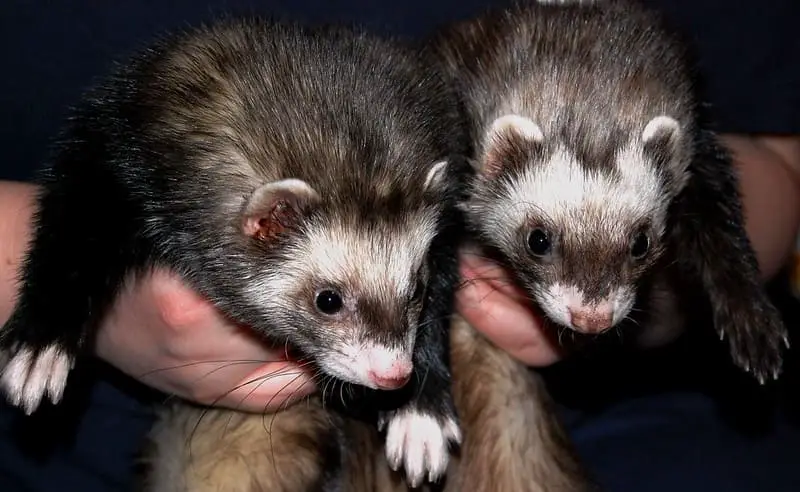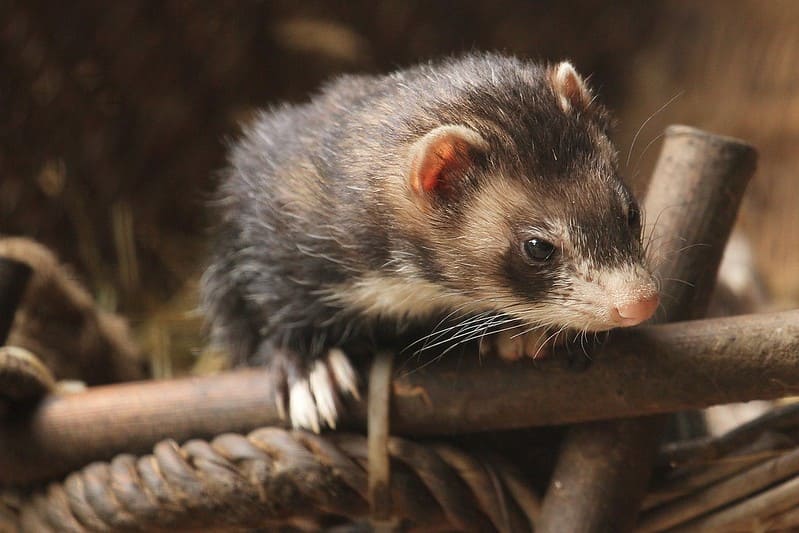Whether you’re a seasoned ferret owner or considering adopting one, understanding the intelligence of these small, fascinating creatures can help you provide them with the care and mental stimulation they need.

Understanding Ferret Intelligence
Ferrets, like many other animals, have their own form of intelligence. While their intelligence may not be measured in the same way as human intelligence, it’s important to recognize and appreciate the unique cognitive abilities and behaviors that ferrets exhibit.
Factors Contributing to Ferret Intelligence
Several factors contribute to the intelligence of ferrets, making them fascinating creatures to observe and interact with. These factors include:
1. Curiosity and Exploration
Ferrets are naturally curious animals. Their drive to explore and investigate their surroundings is a significant factor in their intelligence. This curiosity leads them to discover new things and learn how to navigate their environment effectively.
2. Problem-Solving Skills
Ferrets are excellent problem solvers. They use their intelligence to figure out how to access hidden or hard-to-reach areas. Whether it’s opening a latch, climbing a barrier, or finding a hidden toy, ferrets are persistent and resourceful in their problem-solving efforts.
3. Social Interaction
Ferrets are highly social animals, and their intelligence extends to understanding and interacting with other ferrets and humans. They can recognize and respond to the emotions and intentions of those around them, making them excellent at forming social bonds.
4. Playfulness
Play is an essential part of a ferret’s life. They engage in playful behaviors that mimic hunting and exploring, which not only provides physical exercise but also stimulates their minds. Play allows them to practice their problem-solving and agility skills.
5. Memory
Ferrets have good memory retention. They can remember the layout of their environment and the location of various objects and hiding spots. This memory helps them navigate their surroundings and find items they’ve hidden for future play.
6. Communication
Ferrets use a combination of vocalizations, body language, and scent marking to communicate with other ferrets and humans. Their ability to convey information through different methods demonstrates their cognitive abilities and social intelligence.
7. Learning from Experience
Ferrets learn from their experiences. They remember what works and what doesn’t, which aids in their problem-solving skills and overall intelligence. They can adapt to different situations and apply their knowledge from previous experiences.

Problem-Solving Abilities
Ferrets are natural problem solvers. Their intelligence and problem-solving abilities are evident in various situations:
1. Escape Artists
Ferrets are renowned for their escape artist abilities. They can quickly figure out how to open doors, unlock cages, or climb over obstacles. Their problem-solving skills are particularly impressive when it comes to seeking freedom or finding new places to explore.
2. Toy Retrieval
Ferrets often hide toys and objects during play, mimicking their instinct to stash prey. They remember the locations of their hidden items and can retrieve them when desired. This showcases their memory and problem-solving skills.
3. Food Seeking
Ferrets enjoy scavenging and can be particularly resourceful when seeking food. They may try to open containers or find hidden food stashes, displaying their problem-solving abilities.
4. Social Interactions
Ferrets use their problem-solving skills in social interactions. They can understand and respond to the body language and vocalizations of other ferrets and humans, making them skilled at navigating the complexities of social communication.
5. Learning from Experience
Ferrets learn from their experiences and adapt their behavior accordingly. If they discover that a particular action leads to a positive outcome, they will remember and repeat that action. This ability to learn from experience is a testament to their intelligence.

Social Cognition
Ferrets are highly social animals, and their intelligence extends to their understanding of social interactions and relationships. Here are some aspects of ferret social cognition:
1. Recognizing Individuals
Ferrets can recognize and distinguish between individual humans and other ferrets. They respond differently to different individuals based on their past interactions and experiences.
2. Reading Body Language
Ferrets are skilled at reading body language. They can interpret the gestures and postures of other ferrets and humans, allowing them to understand the intentions and emotions of those around them.
3. Communication
Ferrets use a combination of vocalizations, body language, and scent marking to communicate with other ferrets and humans. They convey information about their mood, desires, and intentions through these communication methods.
4. Bonding
Ferrets form strong social bonds with both their human caregivers and other ferrets. These bonds are based on trust and a shared history of positive interactions. Their ability to form and maintain social relationships is a significant aspect of their intelligence.
Playfulness and Mental Stimulation
Play is a fundamental part of a ferret’s life. Their playful behaviors serve several important functions:
1. Exercise
Play provides essential physical exercise, helping ferrets stay fit and healthy. Active playtime helps them maintain a healthy weight and muscle tone.
2. Mental Stimulation
Play also offers mental stimulation. When ferrets engage in play, they use problem-solving skills and practice various behaviors, such as stalking, pouncing, and exploring. This mental stimulation is vital for their cognitive development.
3. Bonding
Play is a way for ferrets to bond with their human caregivers and other ferrets. It promotes social interaction and strengthens the relationships they form.
4. Mimicking Hunting Behavior
Many of a ferret’s playful behaviors mimic hunting and exploration. These actions are not just for entertainment but also serve as a way for them to practice the skills needed for survival in the wild.

Memory and Learning
Ferrets have a good memory, which is particularly evident in several aspects of their behavior:
1. Object Location
Ferrets can remember the location of hidden objects, such as toys or food stashes. They use this memory to retrieve items they’ve hidden or seek out favorite playthings.
2. Learning from Experience
Ferrets learn from their experiences and adapt their behavior based on the outcomes they’ve observed. If they find that a specific action leads to a favorable result, they remember and repeat that action.
3. Environmental Familiarity
Ferrets are known for their ability to navigate their environment with confidence. They remember the layout of their surroundings, including the locations of hiding spots and pathways.
4. Recognizing Humans and Ferrets
Ferrets can recognize and remember individual humans and other ferrets. They respond differently to familiar and unfamiliar individuals based on their past interactions.
Communication
Ferrets are skilled communicators, using a combination of vocalizations, body language, and scent marking to convey information. Here’s how they communicate:
1. Vocalizations
Ferrets produce various vocalizations, including clucking, chattering, dooking, hissing, and barking. Each vocalization serves a specific purpose and conveys information about their emotions, desires, and intentions.
2. Body Language
Ferrets use body language to communicate with other ferrets and humans. They may display submissive or dominant postures, such as arching their back or puffing up their fur, to convey their feelings.
3. Scent Marking
Ferrets have scent glands on their face and belly, which they use for scent marking. They leave their scent on objects and other ferrets as a way of communicating their presence and territory.
4. Social Interaction
Ferrets excel at understanding and responding to the social cues of other ferrets and humans. They can interpret the intentions and emotions of those around them, allowing for effective social interactions.
Challenges and Enrichment for Ferret Intelligence
To keep your ferret’s mind active and engaged, consider providing challenges and enrichment opportunities. Here are some ideas:
1. Puzzle Toys
Offer puzzle toys that dispense treats when manipulated. These toys encourage problem-solving and provide mental stimulation.
2. Hide and Seek
Play hide and seek with your ferret, hiding treats or toys for them to find. This game engages their problem-solving skills and provides entertainment.
3. Rotating Toys
Rotate your ferret’s toys to keep their environment fresh and stimulating. Ferrets can become bored with the same toys over time.
4. Obstacle Courses
Create obstacle courses with ramps, tunnels, and other interactive elements. Allow your ferret to navigate the course, offering treats and praise for their efforts.
5. Interactive Playtime
Spend quality time playing with your ferret. Use interactive toys like feather wands, balls, and tunnels. Engage in games of chase and hide-and-seek.
6. Social Interaction
Ferrets thrive on social interaction with their human caregivers and other ferrets. Regular playtime and bonding activities provide mental and emotional enrichment.
7. Outdoor Exploration
When the weather allows, consider outdoor playtime in a secure and ferret-proofed space. Outdoor exploration can offer new sights and smells, stimulating your ferret’s senses.
Conclusion
Ferrets are intelligent and fascinating creatures with a unique form of intelligence that is well-suited to their curious and playful nature. Their problem-solving abilities, social cognition, and communication skills make them highly adaptable and engaging pets.
Understanding and appreciating the intelligence of ferrets can help you provide the mental stimulation and enrichment they need to thrive. Offering a variety of toys, puzzles, and social interactions can keep your ferret’s mind active and engaged, ensuring they lead a happy and fulfilling life as part of your family.
As a responsible ferret owner, you can make a significant difference in your pet’s well-being by recognizing and nurturing their intelligence. Embrace their curious and clever nature and enjoy the unique bond that forms with these delightful companions.